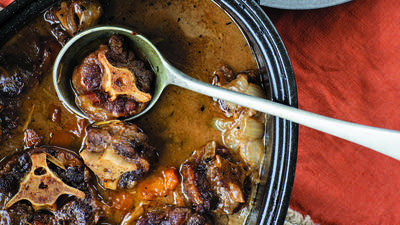
South of Mumbai is a state called Goa that still marches to the Portuguese settlers' tune that influenced its culinary scene, particularly among the masses who converted to Christianity. Pork, vinegar (especially the kind that is extracted from the cashew liquor called feni), and the local cashews appear at numerous meals alongside sweet spices like cinnamon and fiery chiles for balance. For this recipe cider vinegar steps in in lieu of the hard-to-procure cashew vinegar. Serve the pork not with the perfunctory steamed white rice but with buttered, perfectly cooked noodles (wheat, rice, or any other grain).
Ingredients
1 teaspoon cumin seeds
3 to 4 dried red cayenne chiles (like chile de árbol), stems discarded
1 cinnamon stick (about 3 inches long), broken into smaller pieces
1 teaspoon coarse kosher or sea salt
4 large cloves garlic, finely chopped
1 pound pork tenderloin
1 1/2 pounds eggplant
2 medium-size tart apples (like Braeburn or Granny Smith)
2 tablespoons canola oil
1/2 cup cider vinegar
1. Place the cumin, chiles, and pieces of cinnamon stick in a spice grinder (you can also use a coffee grinder) and grind them to the consistency of finely ground black pepper. Stir in the salt.
2. Press the garlic evenly all over the pork tenderloins. Cut off and discard the stems of the eggplants, then cut the eggplants into 1/2 inch cubes. Core the apples and cut them into 1/2 inch cubes.
3. Heat the oil in a large skillet over medium-high heat. Once the oil appears to shimmer, place the garlic-studded tenderloin in the pan and sear the meat on all 4 sides until it is a deep reddish-brown color, about 3 minutes per side. Transfer the browned tenderloin to a plate.
4. Reduce the heat to medium, add the eggplants and apples, and cook, stirring until they absorb some of the tenderloin flavors from the skillet, 2 to 4 minutes.
5. As soon as the eggplant and apples are tender, sprinkle the spice blend over them and cook, stirring to coat, about 1 minute. Pour the vinegar into the skillet and scrape the bottom to release any browned bits. Return the seared pork tenderloin to the skillet, spooning all that eggplant and apple chunky goodness over it. Cover the skillet and cook the pork, without stirring, until an instant-read thermometer inserted in the center registers 145° to 150°F, 10 to 12 minutes. Turn off the heat and let the pork rest, covered with aluminum foil, for 5 minutes.
6. Transfer the pork tenderloin to a cutting board and slice it into 1/2-inch-thick medallions, pink and juicy, bursting with succulence. Arrange the sliced tenderloin on a serving platter and spoon the eggplant and apples over it. Serve warm.
Extra Credit
If you want a little color, sprinkle any fresh herbs you have lying around in the fridge over the pork before you serve it. My favorites are sage and basil, especially when I have an overflowing herb patch toward the tail end of summer.
Excerpted from Indian Cooking Unfolded, copyright 2013 by Raghavan Iyer. Used by permission of Workman Publishing Co., Inc. New York. All rights reserved.
Before you go...
Each week, The Splendid Table brings you stories that expand your world view, inspire you to try something new and show how food brings us together. We rely on you to do this. And, when you donate, you'll become a member of The Splendid Table Co-op. It's a community of like-minded individuals who love good food, good conversation and kitchen companionship. Splendid Table Co-op members will get exclusive content each month and have special opportunities for connecting with The Splendid Table team.
Donate today for as little as $5.00 a month. Your gift only takes a few minutes and has a lasting impact on The Splendid Table and you'll be welcomed into The Splendid Table Co-op.



